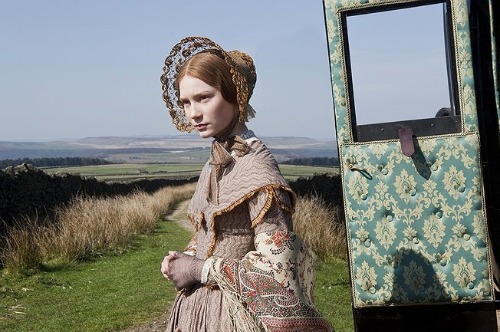Review: Jane Eyre

In ninth grade I read Jane Eyre of my own volition; it wasn't required reading at my school. The novel was dark and romantic, so of course I adored it. I watched the melodramatic 1943 classic with Joan Fontaine and Orson Welles (and a very young Elizabeth Taylor in an uncredited role). I haven't re-read the novel since and was unsure what to expect from this 2011 Jane Eyre film adaptation. Would any slight reference to Wide Sargasso Sea be made? (Answer: not really.) I found myself inferring certain things from that parallel novel as I watched Cary Fukunaga's take on Charlotte Bronte's original story.
Mia Wasikowska plays our heroine Jane as undiminished, wistful and a sort of realist. "I imagine things I'm powerless to execute," she confesses to her employer's housekeeper, Mrs. Fairfax (Judi Dench!). In flashbacks, we see how Jane's young fire slowly dims in her dealings with a spiteful aunt (Sally Hawkins) and then with the teachers at the autocratic school to which her aunt sends her. Her first position after leaving school is as governess to a French-speaking orphan who is under the guardianship of the imposing, darkly handsome and slightly shady Mr. Rochester (Michael Fassbender).
You probably know the story of Jane Eyre from here, but the relationship between Jane and the Rivers family who discover her stranded on the moor is worth a mention. Jamie Bell's St. John Rivers is a striking figure -- the last movie I remembered seeing Bell in was Nicholas Nickleby, and he's certainly filled out since then!
Moira Buffini's screenplay and Fukunaga's deft direction work together to create a film that balances well the creepy and suspenseful moments with the lovely and hopeful. Light and shadow interplay; silhouettes, dim candlelight and natural light are used to set tone throughout Jane Eyre. Some of the shot composition and color palettes used seem reminiscent of Jane Campion's sublime Bright Star (not a bad thing, certainly).
Another likely influence, to the film's string-dependent score by Dario Marianelli at least, is Samuel Barber. Marianelli's music for the film has a more 20th century than 19th century feel to it. It plays sparingly in the film, leaving the quiet in the background of some scenes to create a feeling of uncertainty.
Jane Eyre is naive, since she has lived a good portion of her life in a secluded all-girls school. But both Buffini and Mia Wasikowksa make this character someone who can stand on her own two feet, a woman who could understandably be essential to the true happiness of a certain haunted man.
Jane Eyre has flaws, though they aren't many. The shaky-cam at the start of the film is a bit much. Then some of the scenes from this kinetic beginning reappear in the middle of the movie, which just seems repetitive instead of whatever feeling the director was going for. Some facets of the story get short shrift, but the overall pacing is just right.
The film might be worth a visit to the theater for audience reaction alone: at our screening, one woman yelped in surprise when something popped up onscreen, and there was an audible gasp from a large part of the crowd when Thornfield (Rochester's estate) appears towards the end. My friend and I agreed that those people likely hadn't read the book.

